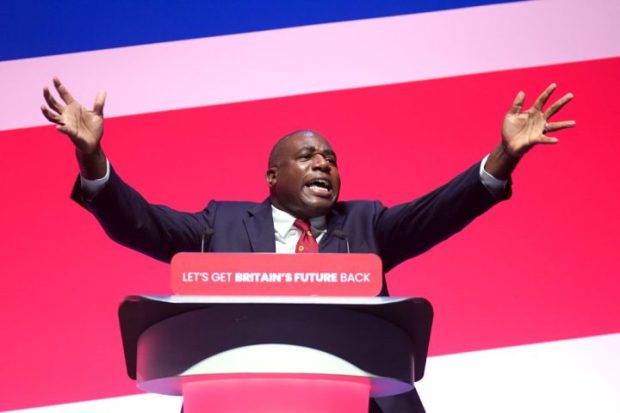David Trimble, who died yesterday afternoon at the age of 77, played a seminal role in forging the Good Friday Agreement of 1998 – becoming the first leader of Northern Ireland’s unionists to share power with Irish republicans. Trimble and John Hume of the SDLP, the then leader of northern constitutional nationalism, duly received the Nobel Peace Prize; Trimble thus became the last British politician to win that accolade.
With his demise (and the deaths of Ian Paisley of the DUP in 2014 and John Hume in 2020), Gerry Adams of Sinn Fein/ IRA now becomes the last surviving leader of the Province’s major political parties from that period – not an outcome that anyone would have bet on at the height of the Troubles.
Trimble vaulted to national and international prominence for his part in the mass Orange protests at Drumcree in his Upper Bann constituency in 1995 – and off the back of them won the leadership of the Ulster Unionists, then the pre-eminent pro-British party in Northern Ireland.
It was an uneasy time for the province’s unionists, coming on the heels of the first IRA ceasefire of 1994 and the fear of many of them that the Conservative government would eventually be prepared to pay a high price at their expense – in order to bring about a permanent cessation of republican violence on the mainland.
These fears were amplified by the subsequent election of a New Labour government in 1997 with a massive majority under Tony Blair. The new prime minister swiftly abandoned the Conservative government’s remaining ‘preconditions’ for admitting Sinn Fein/ IRA into all-party talks: they would no longer have to start decommissioning weapons before sitting round the table with the constitutional parties. This change in UK government policy led to the second IRA ceasefire of that year.
Many unionists, whose community had borne the brunt of the IRA campaign for nearly three decades, could not morally accept remaining in the proposed all-party negotiations with their republican tormentors.
Trimble sympathised but disagreed. He wanted his own people to ‘think politically’: to boycott the talks would allow the future of the Province to be carved up by the British and Irish governments with the nationalist parties of Northern Ireland – which now represented over 40 per cent of the local population.
Moreover, he admired Blair’s modernisation of the Labour party and wanted to do the same for unionism: he further contended that Blair’s constitutional reforms, via a set of devolutionary settlements in Scotland and Wales, could also work for Northern Ireland and thus would potentially end its anomalous status amongst the four component parts of the United Kingdom. Even if they had to share power with republicans, local self government would be better than a rampant democratic deficit under direct rule ministers who represented mainland, not Ulster constituencies.
Even more important, Trimble had come to know Blair as Leader of the Opposition. Despite Blair’s instinctive sympathy for Irish nationalist narratives about the roots of the Ulster conflict, Trimble nonetheless was impressed by what he saw as the New Labour leader’s supreme pragmatism in pursuit of a peace deal. This pragmatism took the form of a renewed commitment to the much vaunted consent principle — whereby there would be no change in Northern Ireland’s constitutional status without the agreement of a majority in the Province. It would take two (communities) to tango.
Trimble contended that Blair’s commitment here was firmer than that of some of his Conservative predecessors at No. 10: under New Labour there would be no repetition of unilateral UK government initiatives such as Edward Heath’s prorogation of the old Stormont in 1972 and Margaret Thatcher’s Anglo-Irish Agreement of 1985.
This belief gave Trimble the confidence to stay in the all-party talks rather than to bolt – as Sinn Fein and other elements in nationalist Ireland hoped he would. It was the biggest strategic call which he made and ensured that he rarely, if ever, lost the ‘blame game’ with the British government in the years to come.
In those negotiations, Trimble – a former law lecturer with a formidable grasp of detail – got much the best of three aspects of the political process that had bedevilled his unionist predecessors: the creation of North-South bodies to accommodate the wishes of nationalists for an ‘Irish dimension’ to the affairs of the island (known as ‘Strand II’ of the talks) never became an issue on his watch. This was because those North-South bodies were made properly accountable to a new Northern Ireland Assembly with a unionist bloc at Stormont (a matter of some significance to unionists once again after the May government signed the Northern Irish Protocol in 2018 and diluted this core principle of the Good Friday Agreement).
Second, Trimble, with the help of Tony Blair and a modernising Fianna Fail Taoiseach, Bertie Ahern, got the best of the constitutional arrangements – securing the scrapping of the irredentist Articles 2 and 3 of the 1937 constitution of the Irish Republic. Northern Ireland’s legitimacy as a political unit would thus be assured at a formal level.
Third, unlike almost all other unionists, he was a strong believer in the importance of East-West arrangements (Strand III) – whose purpose was to provide unionists with assurances that closer relations with Great Britain would counterbalance North-South bodies for Irish nationalists. This seemed peripheral, even quixotic, at the time – but in very different circumstances, it turned out to be the most significant aspect of the Good Friday Agreement to unionists after Theresa May’s Northern Ireland Protocol of 2018 effectively created a border in the Irish Sea for goods.
If Trimble did well in the political process, he did less well in the parallel ‘peace process’: unlike the inclusive political process, the peace process too often became a secretive dialogue between the British government and Irish republicans.
This found its expression in the willingness of the British, Irish and American governments – in varying degrees – to go easy on the demand that Sinn Fein/IRA start disarming before entering the new devolved administration at a reformed Stormont (Strand I).
The debates over who would ‘jump first’ – whether republicans would start the process by decommissioning before entering government with unionists or whether unionists would enter government before republicans had decommissioned their weapons – dominated those years after the signing of the Good Friday Agreement, with unionist opponents of Trimble decrying for accepting a mere side letter from the UK government on Good Friday 1998 pledging to tackle the disarmament question.
But thanks to Trimble’s knowledge and articulateness he was able at each point in the process to hold onto just enough support within the key decision-making bodies of the UUP – and within the wider unionist community – to make it to the next stage of the process. His constituency here was the proverbial ‘Prod in the garden centre’: a segment of ‘Middle Ulster’ which did not crave a return to pre-Troubles Loyalist supremacism, and which sought an accommodation with nationalist Ireland (if only for the sake of the economic benefits of the peace); but equally did want to endure the new ‘in your face’ republican triumphalism either. Trimble was thus speaking quite authentically for this segment of unionist opinion when he was asked by a leading nationalist, ‘what do you want for your people?’ ‘To be left alone’, replied Trimble, in almost Garbo-esque fashion.
Certainly, the three governments were worried about Trimble’s exposure to hostile currents within the wider unionist family: after all, nearly half of unionists voted ‘no’ in the 1998 referendum on the Good Friday Agreement because they regarded it as empowering their unrepentant terrorist foes.
Many in nationalist Ireland held both that Trimble had not ‘sold’ the Good Friday Agreement hard enough to these critics and that he could merely face them down by an act of will. But the truth is that none of the dramatis personae of the process, including Blair and Ahern, would have dared push a policy opposed in such numbers by their core supporters.
Ultimately, the governments worried even more about Adams’ vulnerability in the IRA Army Council and the threat of renewed bombs in London. Trimble ‘jumped’ three times at their behest — in 1999, 2000 and 2001 — despite formidable continuing opposition within his own ranks; he sought to do so again on a fourth occasion, in 2003, but the patience of unionists finally ran out. As noted by Paul Bew – his closest advisor in academe – Trimble could claim the moral high ground, but it was often republicans who enjoyed the inside track in London.
Trimble duly lost the Northern Ireland Assembly elections of 2003 and the DUP for the first time became the numerically dominant force at Stormont (though his unionist opponents in the DUP broadly accepted the revised rules of the political game which he set in 1998-99). He then lost his Westminster seat in 2005 and went to the House of Lords in 2006 as a crossbench peer, not an Ulster Unionist, and crossed to the Conservatives in 2007. Although in some ways a quintessential Ulsterman, he always set his sights on a wider plane, both nationally and internationally than on the Province itself.
Trimble’s last major intervention was on Brexit: he was highly critical of the failure of the May government in 2017-18 to allow Dublin to assume sole guardianship of the Good Friday Agreement in the negotiations leading to the Northern Ireland Protocol. By not asserting the equal importance of the East-West and North-South dimensions of that accord, the Protocol, he believed, undermined the unionist friendly aspects of the Good Friday Agreement, not the nationalist friendly dimensions. He was the first to recognise that the struggle for equal citizenship – giving residents of Northern Ireland the same rights as those in Great Britain – would have to be refought in every generation.
Got something to add? Join the discussion and comment below.
Get 10 issues for just $10
Subscribe to The Spectator Australia today for the next 10 magazine issues, plus full online access, for just $10.
Dean Godson is Director of Policy Exchange and author of 'Himself Alone: David Trimble and the Ordeal of Unionism' (HarperCollins, 2004)




















Comments
Don't miss out
Join the conversation with other Spectator Australia readers. Subscribe to leave a comment.
SUBSCRIBEAlready a subscriber? Log in